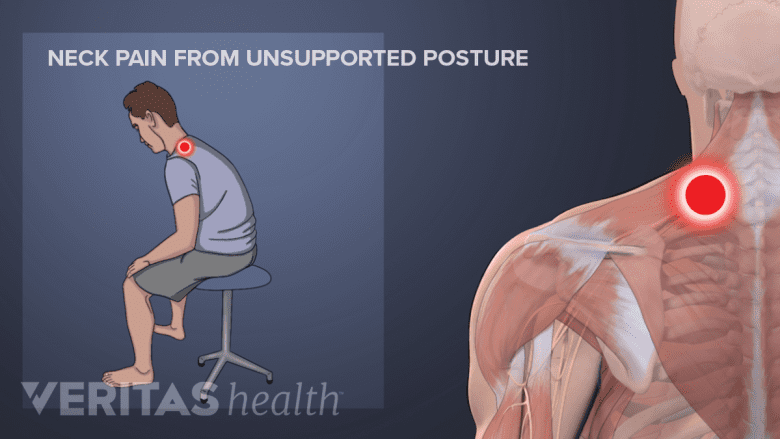Sedentary desk jobs may put workers at an increased risk for long hours of using poor posture, deconditioning neck muscles, and developing a stiff neck. A stiff neck at the office typically develops gradually as it becomes sore and achy, but more severe cases can involve sharp or burning pains that prevent one or more neck movements, such as to one side.
Being aware of what commonly causes stiff necks at the office, as well as strategies for treating them, can bring pain relief and reduce the risk of having a stiff neck return.
In This Article:
Initial Treatments for Stiff Neck at the Office

Heat therapy eases pain, relaxes muscles, and promotes the healing of stiff neck muscles.
When a stiff neck develops at the office, some initial treatments to try may include one or more of the following:
- Take a short break. Getting up from the computer or leaving the cubicle to walk around increases blood circulation and is good for the whole body, including the neck’s joints and muscles.
- Ice or heat therapy. Applying ice or a cold pack within the first 24 to 48 hours may reduce swelling. Depending on what is available in the office, heat therapy may be applied to loosen and relax muscles. Some examples of heat therapy that might be readily available in an office could include a damp, warm towel or heat pack. Some people might find relief by alternating between ice and heat therapy.
- Over-the-counter pain reliever. Acetaminophen (Tylenol) or nonsteroidal anti-inflammatory drugs (NSAIDs), such as naproxen (Aleve) or ibuprofen (Advil), may help reduce pain and are likely to be available at the office. Read warning labels carefully before using.
- Gentle stretching and self-massage. Simple range-of-motion stretches—such as slowly moving the head forward, backward, and side to side—can be performed discreetly while sitting at a desk. If a particular movement starts to increase pain, that movement can be avoided. Even if the neck cannot be moved in certain directions, using the hand and fingers to massage sore neck muscles may also provide some relief.
Some neck stiffness may start to improve soon after applying treatments, but other situations may take a day or two before significant relief is experienced.
How to Prevent a Stiff Neck from Recurring at the Office

Practing good sitting posture throughout the day can help to alleviate neck stiffness.
It is typical for a stiff neck to linger for a few days. As long as concentration levels are not affected too much and daily tasks can be performed safely, a person might choose to continue office work with a sore or stiff neck. The following methods may provide some relief while working through a stiff neck, in addition to lowering the chance for a stiff neck to recur in the future.
- Use appropriate posture. While sitting or standing, the cervical spine is best supported when the head is in neutral position with the ears directly above the shoulders. Using a chair with good support for the lower back, as well as arm rests to keep the elbows by the sides, may help.
- Set computer screen height at eye level. While sitting up straight, the eyes should be able to look straight ahead at the top third of the computer monitor.
- Pay attention to phone use. Whether bending the head to the side while talking, or tilting the head forward while texting, phones are a common contributor to neck pain and stiffness. For people who spend lots of time on the phone, it may make sense to use a headset. When sending texts, holding the phone up higher allows the neck to stay closer to neutral position with the ears directly above the shoulders.
- Remember to take breaks. Taking a short break each hour to either walk around or stand up is a good goal for reducing stress on the spine from sitting. Some apps for phones and computers can set automatic reminders about using good posture, taking breaks, and/or doing gentle neck stretches at the desk throughout the day.
- Consider the commute. For people who have long commutes, stressing the neck with poor posture may start before reaching the office. Remembering to sit up straight while in the car or on public transportation is important. In warmer weather, it may make sense to bike to work or get off public transportation one stop early to walk the rest of the way.
If a sore or stiff neck keeps recurring despite these treatment efforts, a doctor should be consulted.

